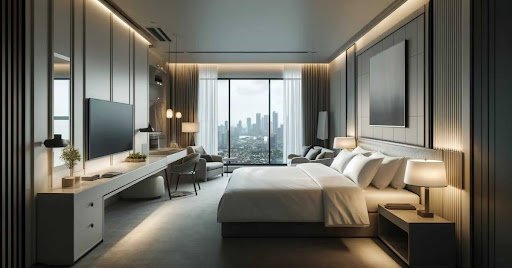In the competitive world of hospitality, every detail matters when it comes to creating memorable guest experiences. From the architectural design of a hotel to the comfort of a chair in the lobby, the quality and style of furniture can significantly impact a guest’s perception. This is why choosing the right hotel furniture supplier plays such a crucial role in the success of any hospitality project.
This article explores the journey of working with a hotel furniture supplier—from concept to completion—highlighting their influence on design, quality, timelines, and overall guest satisfaction.
Why Furniture Matters in the Hospitality Experience
When a guest walks into a hotel, the first impressions are formed instantly. Beyond the architecture and lighting, it’s the furniture that defines the atmosphere. Comfortable chairs in the lobby, stylish tables in the restaurant, or durable beds in guest rooms all contribute to shaping that impression.
A hotel furniture supplier ensures that every piece aligns with the property’s brand identity and meets the needs of the target audience, whether it’s a luxury resort, a business hotel, or a boutique retreat.
The Strategic Importance of Partnering with a Hotel Furniture Supplier
Hospitality projects are large-scale investments that require careful planning. Partnering with the right hotel furniture supplier ensures:
- Consistency in design and quality
- Efficient project coordination
- Long-term durability and maintenance support
- Compliance with safety and environmental standards
A strong partnership saves time, reduces costs, and enhances the overall value of the project.
Defining the Hotel Furniture Supplier’s Role
A hotel furniture supplier does more than deliver furniture. Their role includes:
- Collaboration with architects and designers to align furniture with the project’s vision.
- Customization options to reflect the property’s brand identity.
- Managing production and logistics to ensure timely delivery.
- Post-installation support to maintain furniture longevity.
They are essentially a bridge between concept and guest experience.
Collaboration in the Concept and Design Stage
The foundation of any successful hospitality project lies in planning. A hotel furniture supplier works closely with designers, architects, and developers to:
- Translate brand concepts into practical furniture designs.
- Ensure uniformity across rooms, suites, lobbies, and dining spaces.
- Provide insights on material suitability for different environments.
This collaboration ensures that the furniture not only looks appealing but also serves functional and operational needs.
Material Selection and Quality Assurance
One of the most critical responsibilities of a hotel furniture supplier is material selection. High-traffic environments like hotels require furniture that is both stylish and durable. Key considerations include:
- Durability: Fabrics and finishes must withstand constant use.
- Safety: Fire resistance, non-toxic materials, and structural stability are essential.
- Aesthetics: The furniture must enhance the overall design.
- Compliance: Meeting international safety and hospitality standards.
Through rigorous quality checks, suppliers ensure that furniture meets expectations before it reaches the property.
Customization for Unique Hospitality Needs
Hotels are diverse, and so are their requirements. A hotel furniture supplier offers customization to match brand identity and guest expectations:
- Luxury Hotels: Bespoke furniture pieces that reflect exclusivity and sophistication.
- Boutique Hotels: Unique and creative designs that tell a story.
- Budget-Friendly Hotels: Functional, cost-effective furniture that maintains style.
Customization ensures that no two properties look identical while aligning with brand consistency.
Project Planning and Coordination
Time is of the essence in hospitality projects. Delayed openings can cost hotels revenue and reputation. A professional hotel furniture supplier supports:
- Scheduling production and delivery in line with construction milestones.
- Coordinating with contractors and project managers.
- Managing large-scale orders with efficiency.
Their role ensures smooth project execution without costly delays.
Manufacturing and Production Oversight
The production phase is where a supplier’s expertise becomes critical. They monitor every step of manufacturing to maintain standards. This includes:
- Ensuring materials are cut, shaped, and assembled correctly.
- Conducting strict quality control at each stage.
- Maintaining eco-friendly and sustainable production practices.
By overseeing production, a hotel furniture supplier guarantees consistency across hundreds or even thousands of furniture items.
Logistics and Installation Support
Delivering and installing furniture for a hotel is not a simple task. Suppliers provide logistical expertise such as:
- Coordinating shipping and customs (for international projects).
- Scheduling deliveries to match construction progress.
- Supervising installation to ensure furniture fits as planned.
Professional handling minimizes damage, ensures proper placement, and prepares the property for opening.
Designing with the Guest in Mind
Furniture isn’t just about aesthetics; it’s about guest comfort and usability. A hotel furniture supplier considers:
- Comfort: Ergonomically designed beds, chairs, and sofas.
- Functionality: Smart layouts to optimize limited space.
- Ambience: Creating moods in lobbies, lounges, and dining areas.
When furniture is guest-centric, it contributes directly to satisfaction, positive reviews, and repeat stays.
Cost Management and Budget Control
Budget control is another critical area where a hotel furniture supplier adds value. They:
- Help balance customization with cost-effective solutions.
- Provide long-term value rather than short-term savings.
- Offer flexible options for different types of hotels.
By working within financial constraints, suppliers prevent overspending while ensuring quality.
Eco-Friendly and Sustainable Practices
Today’s travelers care about sustainability. Hotels that embrace eco-friendly practices attract a conscious audience. A hotel furniture supplier can:
- Use responsibly sourced wood and recycled materials.
- Adopt sustainable manufacturing methods.
- Provide certifications that highlight green practices.
This not only benefits the environment but also strengthens a hotel’s reputation.
Real-World Examples of Supplier Impact
- Boutique Hotels: Suppliers provide handcrafted furniture that reflects individuality.
- Hotel Chains: Consistency in design across multiple locations is achieved with supplier expertise.
- Resorts: Durable furniture designed for outdoor use enhances guest comfort in challenging environments.
These examples show how the right supplier can adapt to diverse needs.
Post-Completion Support and Maintenance
The relationship doesn’t end once furniture is installed. A reliable hotel furniture supplier continues to provide:
- Repair and replacement services.
- Maintenance advice for extending furniture life.
- Support for future expansions or refurbishments.
This ensures hotels maintain quality standards long after opening.
Competitive Advantage of Choosing the Right Supplier
Furniture plays a direct role in competitive positioning:
- Positive guest reviews often mention comfort and style.
- Repeat customers return to hotels where they feel relaxed.
- Unique furniture designs differentiate one property from another.
A trusted hotel furniture supplier gives hotels an edge in a crowded market.
Emerging Trends in Hotel Furniture Supply
Modern suppliers are adapting to industry changes with:
- Modular designs for flexible room layouts.
- Locally sourced furniture that reflects regional culture.
- Smart furniture with integrated technology like charging ports and lighting.
These innovations keep hotels relevant and appealing to new generations of travelers.
Challenges and Supplier Solutions
Every project faces hurdles, but an experienced hotel furniture supplier provides solutions:
- Delays: Backup supply chains to prevent missed deadlines.
- Customization issues: Prototypes and mock-ups before full production.
- Logistical challenges: Expert handling of transportation and storage.
By anticipating problems, suppliers minimize risks.
The Future of Hotel Furniture Supply
Looking ahead, the role of suppliers will expand further. Expect to see:
- More sustainable and recyclable materials.
- Increased demand for multifunctional furniture.
- Smarter supply chains to meet global hospitality demands.
Hotels that align with forward-thinking suppliers will remain ahead of industry expectations.
Conclusion
From the earliest design concepts to post-completion maintenance, the role of a hotel furniture supplier is indispensable in hospitality projects. They ensure furniture is not only stylish but also functional, durable, and aligned with the hotel’s brand identity.
By partnering with the right supplier, hotels can create inviting spaces that attract guests, earn positive reviews, and secure long-term success in a highly competitive industry.



